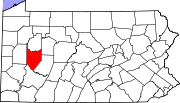Johnetta, Pennsylvania
Johnetta, Pennsylvania | |
|---|---|
Historic community | |
| Coordinates: 40°41′54″N 79°36′05″W / 40.69833°N 79.60139°W | |
| Country | United States |
| State | Pennsylvania |
| County | Armstrong |
| Township | Gilpin |
| Established | 1892 |
| Dissolved | 1930 |
| Elevation | 912 ft (278 m) |
| Time zone | UTC-5 (Eastern (EST)) |
| • Summer (DST) | UTC-4 (EDT) |
| GNIS feature ID | 1205183[1] |
Johnetta is an historic community that is located in Gilpin Township in Armstrong County, Pennsylvania.[1]
History
The town of Johnetta, established in 1892 and dissolved in 1930, is located in the Allegheny valley, the houses being built on a high bluff overlooking the river. Each house was surrounded by a large plot of ground suitable for gardening, and fruit and shade trees were planted along the streets.
The town depended entirely upon the operations of the Pittsburgh-Buffalo Company, controlled by the Jones interests. John H. Jones, president of the company, residing there all the year round. The town was supplied with water and sewerage facilities. The amusement hall contained standard bowling alleys, billiard and pool tables, a refreshment stand, and a large roller skating rink, which was also used for a meeting place.
The town consisted of 140 frame houses, sixteen brick residences, a store, schoolhouse, and the Johnetta Memorial Church, presided over by Rev. Walter Kennedy. The houses were heated by gas taken from the company's own wells. The population was 662, of which about 500 are employees of the company.
The Johnetta Plant of the United States Sewer Pipe Company utilized the Kittanning clay for the manufacture of refractory products. This clay immediately underlaid the Kittanning coal, which was mined in advance of the clay, and which found a ready market at the northern lake ports.[citation needed] The clay seam was about fifteen feet in thickness, of exceptional purity, and adapted to the manufacture of pavers, high-grade face brick and sewer pipe.[citation needed]
A post office called Johnetta was established in 1900. It was operational until 1929.[2]
See also
References
- ^ a b "Johnetta". Geographic Names Information System. United States Geological Survey, United States Department of the Interior.
- ^ "Post Offices". Jim Forte Postal History. Retrieved 6 November 2018.


